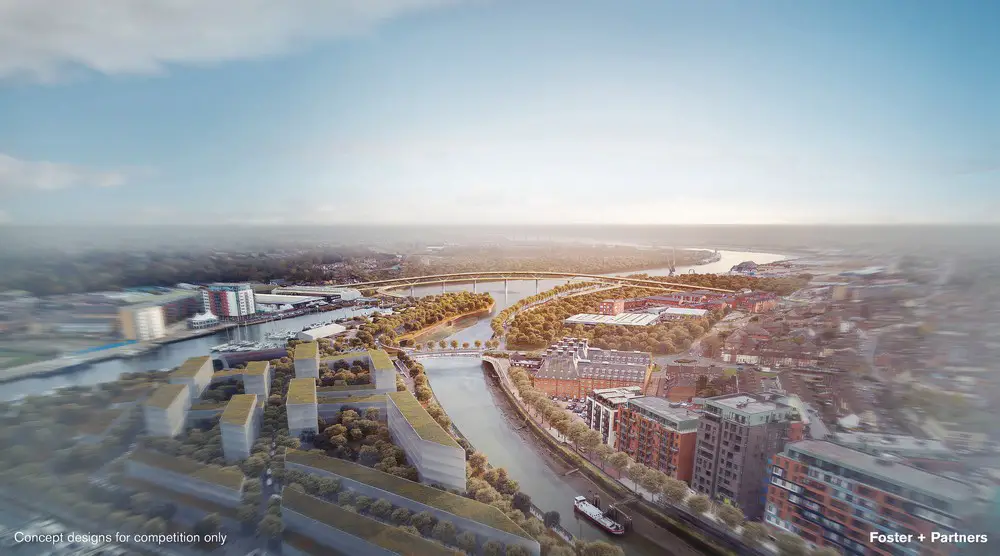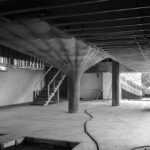RIBA Events 2017 Archive, Architecture Debate London, UK Building Talk, British Architects News
RIBA News & Events 2017
Royal Institute of British Architects Exhibition + Talks + Events Archive
RIBA Events – current news
24 Feb 2017
RIBA News & Events in 2017
Cautious optimism about future workloads – RIBA Future Trends January Survey
The Royal Institute of British Architects (RIBA) Future Trends workload index rose in January 2017, increasing to +24 (up from +17 in December 2016). Overall confidence about future workloads is at pre-Referendum levels.
Practices in the North of England saw the biggest increase in workload expectations (balance figure +48); the South of England and Wales and the West also remained optimistic. London practices were more cautious with the balance figure standing at +15 (unchanged from December 2016).
Large practices (51+ staff) were more optimistic than medium-sized and small practices, but practices of all sizes expected medium-term workloads to increase.
The private house sector forecast increased slightly to +22 (up from +20 in December 2016). The commercial sector forecast also rose, to +4 in January 2017. The public sector recovered marginally, but remained in negative territory at –6; the community sector forecast fell to +1.
The RIBA Future Trends staffing index made a strong recovery, rising to +8 in January 2017 (up from +1 in December 2016). 94% of practices expected their staffing levels to increase or stay the same over the next quarter.
In January, medium-sized practices were again the most optimistic about retaining and increasing staff (balance figure +27), followed by large practices at +25. Small practices were the least confident (balance figure +4).
RIBA Executive Director Members, Adrian Dobson, said:
“Commentary from practices is generally positive this month, particularly for practices working in the private housing sector. Optimism about staffing shows that there is a healthy employment market for salaried architects, which should continue into the spring.
“Workload expectations are at pre-Referendum levels. However, we have yet to see whether Brexit will have a significant economic impact on architects’ work in the long-term.”
24 Feb 2017
‘Aeolian Piano’ at RIBA
A special evening at the RIBA where they will host Catherine Yass’ latest work ‘Aeolian Piano’
‘Aeolian Piano’ is one of a series of works commissioned by White Noise, signalling the departure of the BBC from its iconic site in west London which is now under redevelopment. The film, showing a grand piano suspended by a crane and floating in a circle high above the BBC Television Centre, pays homage to this visionary building.
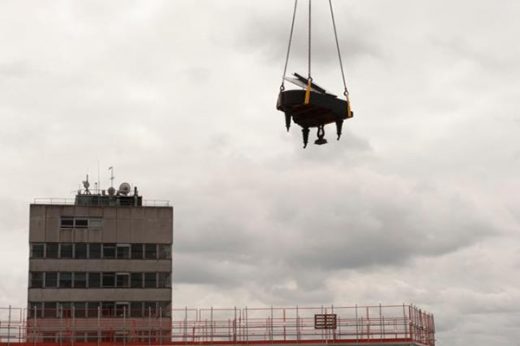
Production stills copyright Hilary Knox
Alongside the screening in the Florence Hall, a selection of RIBA and BBC archive collection photographs will be on display showing the BBC Television Centre in construction, and later in use by BBC staff. A panel discussion between Catherine Yass; Robert Seatter, Head of BBC History; Francesca Hughes, partner of Hughes Meyer Studio; and Alice Cicolini, White Noise will take place in the Jarvis Auditorium at 7pm. The discussion will be chaired by architect and academic, Mark Campbell. ‘Aeolian Piano’ was developed with architectural producer Francesca Hughes.
Yass, who was nominated for the Turner Prize in 2002, works primarily with film and photography. She describes her films as temporal drawings, often capturing architectural sites from unusual vantage points. In 2002 her film ‘Flight’ documented BBC Broadcasting House from a remote-controlled helicopter and she has also filmed locations such as building sites at Canary Wharf in her film ‘Descent’ (2002) by lowering a camera upside down through the morning mist.
Tuesday 28 February, 6pm to 9pm
RIBA, 66 Portland Place, London W1B 1AD
The film screening within the Florence Hall is free of charge and the film will be looped throughout the evening.
The panel discussion at 7pm in the Jarvis Auditorium is ticketed.
23 Feb 2017
RIBA Response on National Audit Office Report
The Royal Institute of British Architects (RIBA) has responded to a new report by the National Audit Office on capital funding for schools:
RIBA President Jane Duncan said “Last year our Better Spaces for Learning report outlined how the Government’s school building programme could deliver better value for existing money.
We are delighted that the National Audit Office has drawn on our research and recommendations in its review, including our call for the Department for Education (DfE) to evaluate the quality of the buildings provided through its main capital programme.
We need to ensure every penny spent on schools stretches as far as possible, and that new schools do not store up problems for the future. We look forward to working further with the DfE to ensure better quality school buildings are delivered for children and teachers now and in the future.”
The NAO report can be found here: http://www.nao.org.uk/report/capital-funding-for-schools/
7 Dec 2016
RIBA Future Trends forecast reveals architects expect recovery to continue
• Value of work in progress increasing but at a lower rate than previous years
• Medium-sized architecture practices remain the most optimistic about future workloads
• Large architects practices regain confidence in staffing and workloads
The RIBA Future Trends workload index rose significantly in October 2016, to +16 (up from +8 in September). Despite the sustained increase, the workload index is still below pre-referendum levels.
Architects based in the Midlands and East Anglia and the North of England remained optimistic. London practices continued to be more cautious, with a balance figure of zero, indicating that workloads are expected to remain the same.
Medium-sized practices were the most confident at increasing workloads (balance figure +27), followed by small practices (balance figure +16). Large practices are beginning to recover from earlier anxiety over workloads, with a balance figure of +15.
Forecasts for the commercial sector (+1) and private housing sector (+16) remained unchanged from September. The public sector forecast fell slightly, standing at –4 in October. The forecast for the community sector increased marginally to zero.
The RIBA Future Trends staffing index saw little change, rising to +1 from zero in September, showing that practices expect to maintain current staffing levels.
As with the workload index, large practices are beginning to regain some confidence in maintaining staff levels, with a balance figure of +8. However, medium-sized practices were the most positive about future staffing (balance figure +18). Small practices were the least confident, returning a balance figure of –1.
The value of overall work in progress continues to increase; however, the annualised rate of 1% is much lower than the levels seen from 2014 to early 2016.
RIBA Executive Director Members Adrian Dobson said:
“Comments from architects continue to present a mixed picture, with many practices working in the private housing sector indicating an increase in work since the summer. Meanwhile, many practices reported seeing fee levels increasing.”
“However, this was tempered by caution over funding uncertainty, especially on commercial sector work. Public sector work is experiencing a similar level of unpredictability.”
3 Dec 2016
Professor Christine Hawley wins 2016 RIBA Annie Spink Award
The Royal Institute of British Architects (RIBA) has announced the winner of the 2016 RIBA Annie Spink Award for excellence in architectural education.
Professor Christine Hawley, Professor Emeritus of the Bartlett School of Architecture (UCL), will be presented with the award at the RIBA President’s Medals Ceremony in London on 6 December.
The biennial prize is awarded to an individual who has made a significant contribution to the advancement of architectural education in a school of architecture anywhere in the world that offers courses validated by the RIBA.
RIBA President Jane Duncan said:
“Congratulations to Professor Christine Hawley on winning the 2016 RIBA Annie Spink Award. Christine is a dedicated and talented teacher whose enthusiasm has helped inspire generations of young architects. She has long been a champion for excellence in architectural education throughout her career and I am delighted to see her recognised through this award.”
On receiving the award, Professor Hawley said:
“Who would not be absolutely thrilled at being awarded the RIBA Annie Spink Award? It is an absolute honour.
“I have been lucky enough to work with some of the most creative young students in architecture for the last four decades but the act of teaching, for me, has also been about learning – sometimes they are the teachers and I am the pupil.
“As someone who has also been the Head of two Schools of Architecture and the Dean of the Bartlett I have also learnt another important lesson: a creative environment is made only through people. I have collaborated with truly great teachers so this award honours both the students and teachers I have worked with.”
Biography of Professor Christine Hawley:
Christine Hawley completed her Architectural Association Diploma in 1975. While she was completing her studies, she worked for the Department of Environment and practiced with Renton, Howard, Wood and Levin Architects. From 1972 to 1973 she practiced with De Soissons Partnership Architects and Yorke Rosenberg and Mardell (YRM) Architects.
In 1975, Hawley became a partner in Cook and Hawley Architects. In 1978 she registered as a British architect and practiced with Pearson International Architects. In 1998 she established Christine Hawley Architects.
Hawley’s academic career is long and distinguished. From 1979 to 1987 she taught at the Architectural Association School of Architecture, and from 1987 to 1993 she was head of the University of East London School of Architecture (formerly PEL). In 1993 she became Professor of Architectural Studies at London’s Bartlett School of Architecture, Building, Environmental Design and Planning. In 1999, Hawley was made Dean of the Faculty of the Built Environment and Head of School at the Bartlett, the largest graduate school specialising in the built environment in the UK. Since 2015 Hawley has held the title of Professor of Architectural Design.
The £10,000 Annie Spink award is financed by the Annie Spink Trust Fund, which was established in 1974 by architect Herbert Spink FRIBA. He bequeathed the trust as a lasting memorial to his wife Annie, who died in 1938, as an honour for the ‘advancement of architectural education’. Past recipients of the Annie Spink Award include Florian Beigel, Nigel Coates, Peter Cook and Dalibor Vesely.
23 Nov 2016
RIBA response to the 2016 Autumn Statement
23rd of November 2016 – The Royal Institute of British Architects (RIBA) has today responded to The Chancellor of the Exchequer, Philip Hammond’s, Autumn Statement.
RIBA President Jane Duncan said:
“The Chancellor’s recognition that the housing crisis is causing huge damage to the British economy should be a milestone in our political debate. However the Government needs to go much further to tackle the housing crisis. The commitment to support the infrastructure needed to enable house building is welcome, but the Government must ensure that all national infrastructure spending maximises opportunities to build housing. The RIBA has previously called for housing to be added to the remit of the National Infrastructure Commission and I believe that these announcements make the case even stronger. I am disappointed that in highlighting the need to ‘live within means’, the Chancellor did not address the pressing challenge of climate change and urgent need to decarbonise the economy via the new industrial strategy.”
On housing
“The RIBA welcomes the £1.4billion boost to the Affordable Housing budget and the £2.3billion new Housing Infrastructure Fund, which will help pay for the infrastructure necessary to deliver up to 100,000 new homes. Equally important is the announcement that the Government will provide the option for housing associations to use Affordable Housing money to build homes for a range of tenures, not just home ownership products. This will ensure they are better able to build homes which reflect the needs of local people and create sustainable, mixed communities.
“However, it is disappointing that the Government has not gone far enough to entrust local authorities to deliver the homes needed, by allowing them to borrow to build for social housing. Neither has the Chancellor provided any funding for homes for social rent. Both these actions are necessary to ensure that genuinely affordable homes are available for those on low incomes. We look forward to the forthcoming White Paper on housing delivery, which should set out a long-term plan. We hope to see an ambitious, broad-based strategy to deliver the homes our country needs.”
On devolution
“The RIBA welcomes the continued commitment to devolving power and resources to local authorities. However, we need to go further on and faster if we want to truly tackle the challenges that parts of this country face. City devolution offers the opportunity to link housing, transport and infrastructure together to create sustainable, thriving healthy and happy communities. It is crucial that, as part of the developing devolution agenda, they are also equipped with the tools to drive up both housing supply and the quality of new homes.
“England has a proud history of strong civic and business leaders working together to rejuvenate urban spaces and better the lives of their citizens. I’m confident, with the necessary powers and resources devolved from central Government, our new Metro Mayors can build on this tradition.”
On broadband investment
“It is welcome that the Government is looking to boost development of broadband infrastructure. The RIBA and its members are leading the development of digital innovation, supporting solutions such as Building Information Modelling, to solve problems in the built environment. Support for key infrastructure such as broadband means that the SME architects, who make up the majority of the RIBA’s membership, can take advantage of innovations in new technologies.”
On export funding
“The RIBA has been meeting with Government to discuss ways in which UK architects can export their sought-after expertise across the world. It is positive that the Government has today signalled the importance of access to finance and management skills, in order to support the UK’s businesses abroad.”
On sustainability
“The most crucial element of infrastructure, the bricks and mortar of our existing building stock, is missing from the Government’s list of priorities. It is crucial that economic growth is driven, while also addressing national challenges of safeguarding energy security and tackling climate change. For this to happen energy efficiency needs to be fully integrated within the UK’s infrastructure plan to make our housing stock fit for the future.”
31 Oct 2016
Regional Mayors need ‘radical’ housing powers to prevent London-style housing crisis
• Government aim of expanding home ownership by building a million new homes at risk as Mayors lack powers to build more homes.
• With Mayors set to take charge in Greater Manchester, the West Midlands and Liverpool City Region, they need to be able to decide on key policies – such as whether to build on regional green belts.
• The capital city itself needs more powers to address its housing crisis, says report from IPPR North, supported by the Royal Institute of British Architects (RIBA).
• England’s major cities risk a ‘London-style’ housing crisis unless radical powers over housing are handed to Mayors, according to a new report.
31 October 2016 – IPPR North’s report Closer to Home sets out the big housing challenges facing the new wave of ‘Metro Mayors’ set to be elected for the first time in May 2017.
Abode, Great Kneighton by Proctor and Matthews:
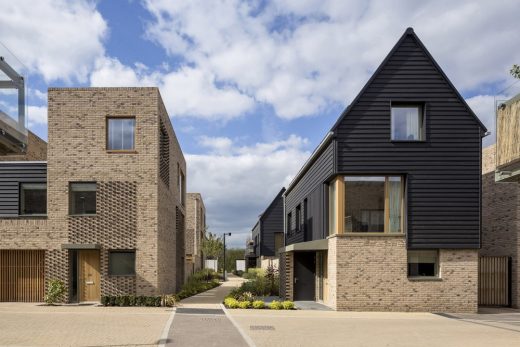
photo © Tim Crocker
It argues that England is not one housing market but many – and that Mayors are best placed to tackle housing issues – such as the increasing difficulty facing first time buyers getting a foot on the housing ladder, and possible fall in private sector construction as a result of Brexit.
Unless significant powers over planning and housing are handed to new Mayors, the government will miss its housebuilding target – and risk a repeat of the London mayoralty, where successive mayors have failed to address major problems in the capital’s housing market.
The report states that that brownfield land is in too short supply to meet the government’s million homes target. It highlights figures from leading consultancy Nathaniel Lichfield and Partners, based on DCLG data, which show that:
• the Northwest has brownfield capacity for 166,211 homes and a long-term need of 263,168 new homes
• in Yorkshire and Humber, there is brownfield capacity for 71, 555 homes and a need for 271, 602 homes
• in the Northeast, there is brownfield capacity for 44, 407 homes and a need for 115, 025 homes
• in the West Midlands, there is brownfield capacity for 66,635 homes and a need for 266, 391 homes.
The government has devolved some powers to some councils, the report notes – for example the ability to integrate new housing with other infrastructure projects, such as transport or economic hubs.
The report argues that government should adopt a deal-making approach to housing devolution. It argues that the following powers should be devolved:
• control over the greenbelt, so mayors can potentially allow development on strategic parts of this – in consultation with local residents
• handing mayors stamp duty proceeds from new build homes as an incentive to increase supply
• powers to levy tackle empty homes – are still within central government control, the report notes.
But in return, mayors should themselves set out to government how they will meet a number of challenges – including:
• releasing sufficient public land – and identifying private sites – to meet housebuilding targets
• set out plans to speed up the planning system for developers – for instance, by relaxing planning rules
• showcase how they will help small and medium businesses enter the market, for instance in breaking up larger developments into smaller chunks.
The report will be launched on Monday 31 October in central Manchester, with speakers including DCLG director-general for decentralisation Simon Ridley, shadow housing minister Roberta Blackman-Woods and Conservative candidate for Greater Manchester mayor Sean Anstee.
RIBA President Jane Duncan said: “City devolution offers the opportunity, for the first time to link housing, transport and infrastructure together to create sustainable, thriving healthy and happy communities. It is crucial that, as part of the developing devolution agenda, they are also equipped with the tools to drive up both housing supply and the quality of new homes.
Darbishire Place Housing:
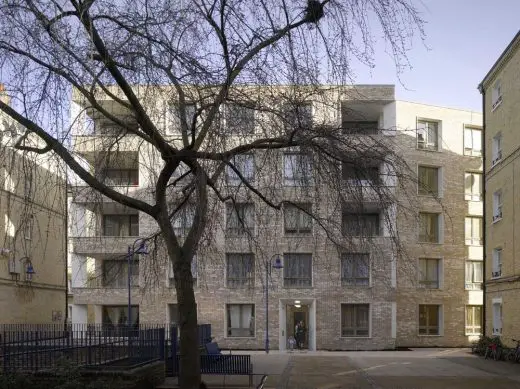
photo © Nick Kane
“English cities like Birmingham, Liverpool, Sheffield and Manchester have a proud history of strong civic and business leaders working together to rejuvenate urban spaces and better the lives of their citizens. I’m confident, with the necessary powers devolved from central Government; our new Metro Mayors can build on this tradition.”
Charlotte Snelling, report author and researcher at IPPR, said: “England is not one housing market but several. The housing crisis manifests itself very differently – the problems facing Kensington in London – namely supply – and the problems in Kensington in Liverpool – namely quality and decent homes – are best tackled locally.
“There is no doubt that successive London mayors been successful in using their significant levers on transport, but the powers given to Ken, Boris and Sadiq over housing even today are still too piecemeal and partial.
“The last thing we want to see the new wave of Mayors facing a London-style housing crisis in the future.”
Ed Cox, Director of IPPR North, added: “The Northern Powerhouse and Midlands Engine will be driven by Mayors, and it’s vital they have the powers to build enough homes – a London affordable housing crisis up here would be a disaster.
“With brownfield land in limited supply, it should be decided locally how to meet housing needs including difficult decisions about the greenbelt.
“If the government is serious about its One Nation credentials in expanding home ownership, it should remember radicals like the revolutionary Birmingham mayor Joseph Chamberlain and let city-regions really take back control.”
1 Oct 2016
RIBA announces 2017 Honorary Fellowships
30 September 2016 – The Royal Institute of British Architects (RIBA) has announced the 2017 RIBA Honorary Fellowships, which will be awarded to eighteen individuals from a diverse spectrum of backgrounds, including journalism, local government, art, architectural history and design.
RIBA expands its Part 2 Bursary scheme for 2017/18
30 September 2016 – The Royal Institute of British Architects (RIBA) is calling for applications for the RIBA Part 2 Bursary scheme.
In 2017, an additional £18,000 worth of funding is available, increasing the number of Part 2 Bursaries from five to eight – including the Rosenberg bursary, made possible by the generosity of the Rosenberg Memorial Fund.
The £6,000 bursaries aim to support eight Part 2 students for the academic years 2017/18 and 2018/19. Successful students will receive £1,000 a term throughout their Part 2 course (for up to a maximum of six terms).
This scheme supports architecture students looking to embark on an RIBA-validated Part 2 course within the UK. The bursaries aim to support students experiencing financial hardship who otherwise may not continue with their architectural studies. It is the most generous award made to architecture students in financial need.
RIBA President Jane Duncan said:
“It is crucial that financial barriers to the profession are dismantled to ensure that future practitioners are diverse, successful and inspired. I am delighted that the generous support of the profession has enabled us to extend this scheme, and therefore help more students than ever before to continue onto a Part 2 course.”
RIBA London Event information from RIBA
Location: 66 Portland Place, London, England, UK
RIBA Events Archive
RIBA Event London – Archive
Chartered Institute of Building
RIBA Trust Autumn Lecture Series 2009
London Architecture Events
Bartlett School of Architecture Event
Comments / photos for the RIBA News & Events for 2017 page welcome

